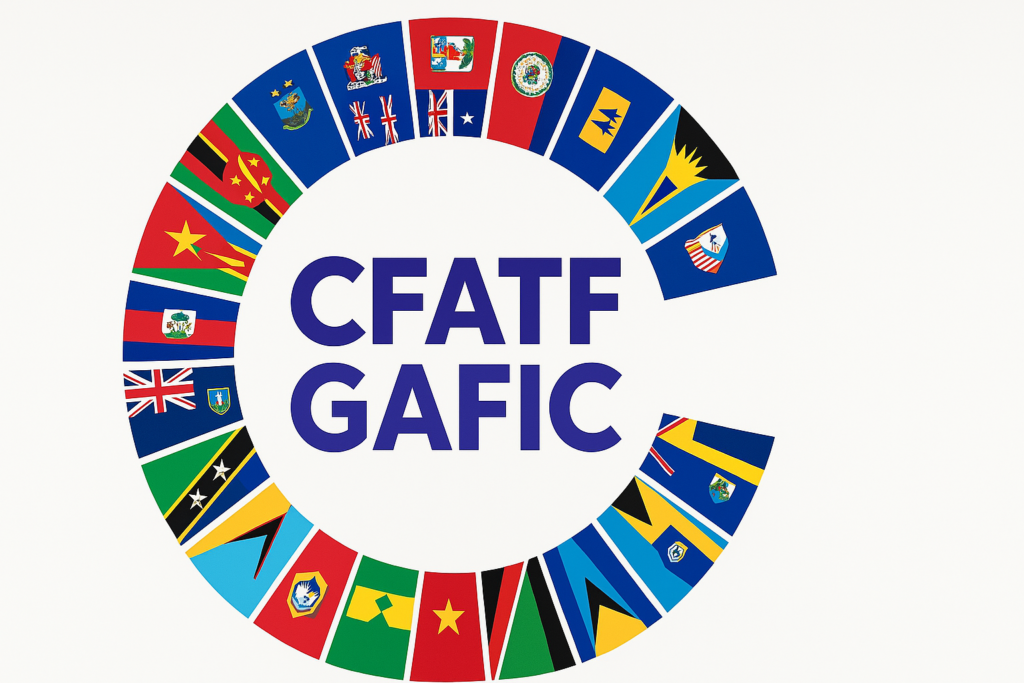
There are currently various entities and organizations that operate and participate in different ways in the prevention of money laundering and the financing of terrorism. One such type of body is the FATF-style regional bodies — FSRBs. As of now, nine FSRBs have been established, such as GAFILAT, all of which are integrated into the FATF’s global network of supervisors. One of these entities is the Caribbean Financial Action Task Force, which covers the Caribbean Basin, Central, and South America.
Its conceptualization dates back to May 1990. At that time, in the Aruba region, countries from the Caribbean area outlined 19 recommendations specific to the region for the prevention of money laundering, complementing those issued by the FATF. Two years later, in the city of Kingston — Jamaica — Ministers and other representatives of Caribbean and Latin American governments enacted the Kingston Declaration on the prevention of money laundering, which established the following key elements:
- The ratification of the 1988 United Nations Convention against illicit traffic in narcotic drugs and psychotropic substances,
- States commit to implementing the 40 FATF Recommendations,
- A stable organizational structure is established to coordinate and facilitate the work of the CFATF.
The Kingston Declaration established a Secretariat as the coordinating body. This entity is responsible for organizing and coordinating member state evaluations, as well as “facilitating the training and technical assistance needs of CFATF members.” The Secretariat is based in Trinidad and Tobago and has remained there since the Kingston Declaration was adopted.
The CFATF was created to prevent money laundering, the financing of terrorism, and the proliferation of weapons of mass destruction. This goal is achieved through the implementation of the FATF Recommendations, mutual cooperation between States, and the monitoring of national policies of member countries.
The CFATF is structured around three main bodies: the Plenary, the Secretariat, and several technical working groups. The Plenary, composed of representatives from all member States, serves as the main decision-making forum. The Secretariat, headquartered in Port of Spain, Trinidad and Tobago, handles administrative and technical functions and coordinates activities stemming from Plenary decisions. Among the working groups are the International Cooperation Review Group, the CFATF Working Group on FATF Issues, and the Working Group on Risks, Trends, and Methods.
As with other FATF-style regional bodies, the core of CFATF’s work lies in mutual evaluations carried out by its members. These evaluations involve assessing the systems and mechanisms implemented by countries to prevent money laundering and terrorist financing. During this process, the level of compliance with the 40 FATF Recommendations is assessed, along with the various risks that the evaluated country may face.
Mutual Evaluations are designed and implemented by CFATF member States. For instance, the Mutual Evaluation Report of Belize was carried out by a team of experts from The Bahamas, Saint Kitts and Nevis, the Cayman Islands, and Saint Vincent and the Grenadines.
Currently, the CFATF is composed of 24 States and jurisdictions:
- Antigua and Barbuda
- Anguilla
- Aruba
- Bahamas
- Barbados
- Belize
- Bermuda
- British Virgin Islands
- Cayman Islands
- Curaçao
- Dominica
- Grenada
- Guyana
- Republic of Haiti
- Jamaica
- Montserrat
- Saint Kitts and Nevis
- Saint Lucia
- St. Maarten
- Saint Vincent and the Grenadines
- Suriname
- Turks and Caicos Islands
- Trinidad and Tobago
- Venezuela
I am an obliged entity and looking for an AML tool.
Great! You’ve come to the right place at the right time. Request a demo with the Pibisi team and tell us what you need with no obligation.
I’m not sure if I’m an Obliged Entity…
No problem, it’s a very common question. Take our simple questionnaire and find out NOW.
If you want to stay updated with new articles, subscribe to our newsletter if you haven’t done so already.
And if you’d like to suggest a topic you’d like us to write an article about, or you simply want to get in touch with us, you can do so via our contact form.

